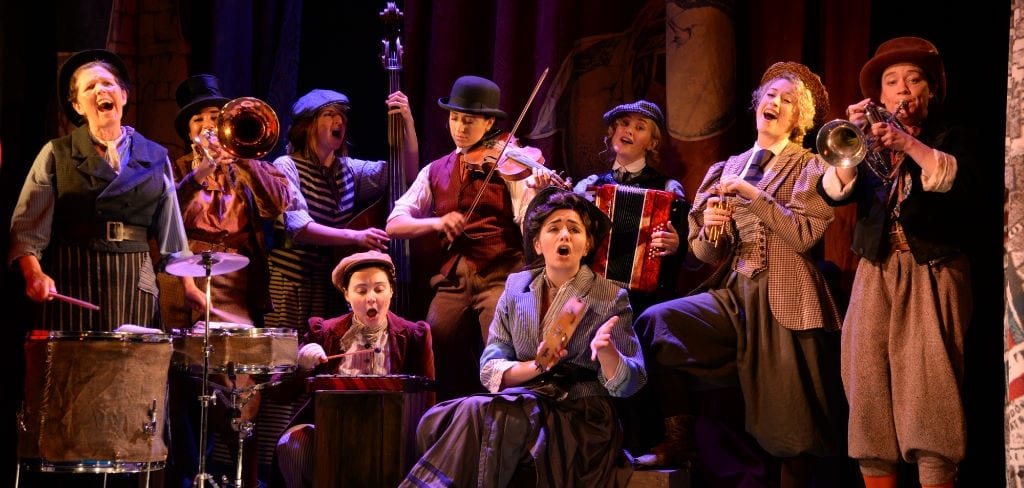If you were inventing two rival gangs for the purposes of a musical, you probably wouldn’t call one of them the Oranges, a word which notoriously rhymes with precisely nothing in the English language. Even Sondheim would have been stumped – “When you’re an Orange/You’re an Orange all the way/From your first… OK, maybe let’s call them something else.” But Lil Warren had no such option, as both the Oranges of Bethnal Green and the Elephants of Walworth Road are genuine Victorian girl gangs; the former of Jewish origin, the latter Irish immigrants.
Despite the subject matter, neither Warren’s book and lyrics nor Jo Collins’ music owes much to West Side Story – like so many shows at Hoxton Hall, this one pays tribute to the venue’s music hall history. Thus we have Susannah van den Berg, credited as “Chair”, acting as a kind of ringmaster/compère/MC/carnival barker – introducing the action, bantering with Collins at the keyboard and cajoling the audience into joining in with a few musical numbers. And the story isn’t one of the members of opposing gangs falling for each other so much as a naive innocent, Mary from the black country, wandering into their midst and causing mayhem as both gangs compete to claim her for their own nefarious purposes. And all she wanted was to be a star in the music hall.
If Mary has trouble telling the two gangs apart, I can’t say I blame her, as the accents are patchy at best – only two of the Irish gang ever sound Irish (and only one consistently), and despite the use of the occasional Yiddish term, their rivals don’t seem to be attempting the accent (beyond generic east end) at all. Nevertheless, Susie McKenna’s staging and Johanna Town’s lighting are often very effective, and the show as a whole is great fun, though at two and a half hours it threatens to overstay its welcome towards the end. There are some lovely jokes at the expense of modern-day Hoxton and Shoreditch – well, New York’s Upper West Side is a little different these days too – and the reluctance, even then, of Hackney carriages to go south of the river.
The show makes great play of its feminist principles – over 30 women are directly involved in this production, the programme tells us – and the repeated song about how we’re not responsible for the bodies we ’re born into, though nominally about wealth and class, has an obvious feminist relevance too. One could argue that showing that girls are just as capable as boys of sexual predation and senseless violence is a bit of an own goal – and if we’re going down the road of identity politics, that there isn’t a great deal of ethnic diversity in the cast. Whatever your feelings about that, the clunky segue into the #metoo and #timesup movements in the closing song is an afterthought which might better have been avoided. Performance of the night was Rebecca Bainbridge as the psychotic Ada, closely followed by Sinead Long as Mary, Kate Marlais as Maggie and Susannah van den Berg as the MC.

